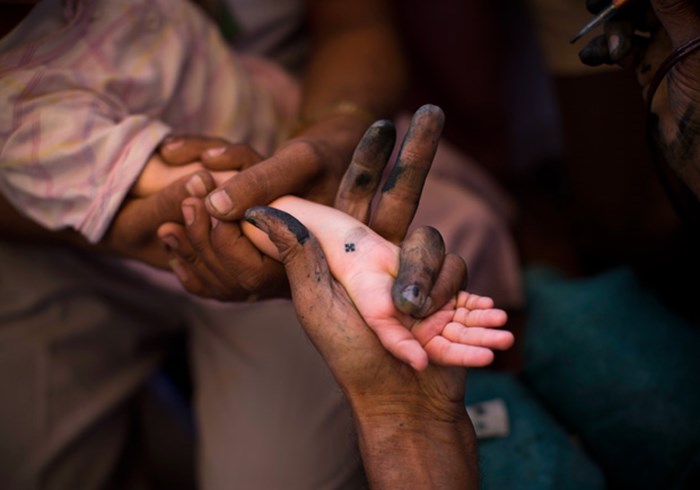
Many Egyptian Christians wear their faith on their sleeve—literally. The cross tattooed on the wrist of Coptic Orthodox believers is a public display which marks their identity for all to see.
Such a quiet witness usually avoids reproach. But recently in Libya, radical Muslim militias detained dozens of expatriate Christians in Benghazi. Amid allegations that captors seared off such tattoos with acid, one Christian died from medical complications during the ordeal, and a Libyan church was repeatedly attacked.
Accusations of evangelism have been at the heart of a series of recent incidents of violence—including the first Coptic martyrs of the modern era—against Copts in Libya, Sudan, and Egypt. Which raises the question: Are Copts starting to recover their missionary heritage?
The region-wide incidents serve as a reminder that the Coptic Orthodox Church is not limited to Egypt alone. It once represented a great missionary force, planting churches in Libya, Sudan, and Ethiopia as well as leaving imprints as far afield as Switzerland and Ireland.
Centuries of life as a tolerated minority under Muslim rule turned Copts inward, and the evangelism impulse waned. Yet this memory is retained in the liturgy, where at every mass the deacon chants, "Pray for the salvation of the world, and this city of ours."
Perhaps Copts are starting to remember as the political struggles following the Egyptian revolution continue to sharpen the lines of religious identity.
"As Islamism increases, so does the Christian commitment to religion," said Atef Gendy, president of the Evangelical Theological Seminary of Cairo. The seminary offers classes on both dialogue and evangelism. But Gendy notes that personal evangelism, which he urges be mindful of social norms, is impossible to quantify.
Alternately, such accusations of proselytism may be just one more tool to widen sectarianism as Islamists compete to stamp their image on society.
In Libya, this has become the dominant explanation.
"[Benghazi] is a very serious incident," Bishop Pachomious, whose west Egyptian diocese includes the cities of Libya, toldAhram, "in which Egyptian citizens were arrested on the mere suspicion [of proselytizing] and tortured while in detention."
Yet the bishop doubted that members of his flock were guilty of the charge. "It doesn't make sense," he said, "that as many as 100 Egyptian Copts had decided to engage in proselytizing activities in another country."
Indeed, even from video released by their original Salafi Muslim captors, it does not make sense. Seized Christian materials are easily identifiable as in-house products for Coptic religiosity.
"Our relations with Libyans are very good," Father Boula, who serves more than 3,000 Copts in Benghazi as priest of St. Anthony's Church, told CT prior to the incident. "We exchange visits, they respect us for our work, and they even give me hugs in the street."
Most of the arrested Copts have been released and returned to Egypt for failing to have proper residence papers, according to a Coptic priest in Misrata.
"These youth had been here for years, they have no connection to evangelism," said Father Marc. "I think this was in response to those who had been earlier arrested for evangelism."
Marc refers to three foreign Christians and one Egyptian, Sherif Ramses, who were arrested in February. Authorities claimed 45,000 Bibles were confiscated. According to Morning Star News, Ramses allegedly told his captors, when asked why he felt he could distribute them, "They say Libya is supposed to be a free country."
Libya has traditionally welcomed Copts as part of the foreign work force, and facilitated their freedom to worship. Marc estimates that 10,000 Copts live in Libya, most of whom are doctors, engineers, teachers, and manual laborers. He has served in Misrata for 15 years without incident, and speaks warmly of the Libyan people. But an unprompted and still unexplained December attack shook his community.
"We have suffered the first Coptic martyrs outside Egypt in the modern era," he said, referring to two parishioners who died after an unknown assailant tossed a bomb into a church service. Authorities have since provided round the clock security presence, even amid Libya's general state of lawlessness.
"Things are ok, we attend church regularly and pray with no problems," he said. "But if there is any sound of trouble, the people get very nervous and we have to calm them."
If Copts in Benghazi are suffering because of some connection to evangelism— however tenuous or real—those in Misrata appear simply to be a victim of political instability seeking to play the religion card.
This volatile mix is present in Sudan as well.
Last December, two Coptic Orthodox priests were arrested after baptizing a female convert from Islam. Since the arrests, stories about arrests of Westerners and other Christians attempting to spread the faith circulated in media linked to the state security apparatus, although the accuracy of the reports is hard to ascertain.
Though some Sudanese Copts have enjoyed business success under the Islamist government of President Omar al-Bashir, other denominations have seen their churches destroyed either by mobs or by the state, which cites the breaching of planning laws. With the independence of South Sudan removing the great majority of the nation's Christians, Bashir has promised a 100-percent Islamic constitution.
"The Copts of Sudan have lived in Sudan as citizens," wrote Father Filotheos Farag in his 2012 book Copts of Sudan. "They do their duties but it is seldom that they ask for their rights." Farag was born in Upper Egypt, but has lived in Sudan since 1963. The priest is a leading Coptic advocate of peace and reconciliation among Muslims and Christians, and has led mediation efforts in Darfur.
Sudan's approximately 100,000 Copts arrived in waves of immigration throughout the centuries, explains Farag, and have generally kept good relations with government and society. As Arabs who lived mainly in the northern part of the country, Copts were distinct from Christians with origins in the rebellious south. The latter, speaking a host of additional languages, professed a more 'African' identity, making them inevitable opponents of the government's Arabizing plans. This situation, many analysts say, led to Sudan's second civil war.
"Democracy will be the solution to everything," Farag said, speaking hopefully about the worrisome developments since the Arab Spring.
But one prominent Sudanese Christian intellectual in Khartoum, who requested anonymity, believes the relative success Copts have enjoyed may be coming to an end.
"This will mark the end of their honeymoon," he said, describing what he believes is an increase in intolerant and rigidly Islamist rhetoric in the pro-government media.
In his view, while the case of religious conversion causes tensions, it is also used as a pretext by an unpopular government. "The regime wants to divert the people's attention from the economy," he said. "It's better to tell [Muslims] their religion is being threatened."
There are signs Muslims feel threatened in Egypt as well. Recently churches have been attacked in Beni Suef and Aswan over female converts to Christianity alleged to be hidden inside. Generally this is understood as a Muslim community effort to save face when a woman breaks community traditions or runs away with a lover. Others think true faith might have a role.
"It is an untold story that every now and then a Muslim can be convinced and convert to Christianity," said Youssef Sidhom, editor-in-chief of the Coptic newspaper Watani. "It is always done secretly, but somehow here it became public. In Upper Egypt especially, this creates a social scandal regardless of the direction of the conversion."
The reality is the Coptic Orthodox Church remains committed to planting churches—just not in the direction of Muslims. In the 1970s, Pope Shenouda consecrated the first of two bishops for service in sub-Saharan Africa. Today, 65 churches serve more than 400,000 Copts in Kenya, Zambia, Congo, and other nations.
"The early riches of the Orthodox tradition are spreading again in Africa," said Antonious Marcos, appointed missionary bishop to Kenya in 1976 and now based in South Africa. "Our church is a missionary church, because it was started by a non-Egyptian: John Mark."
Marcos obtained a doctorate in missiology from Fuller Theological Seminary, conducts liturgy in the local languages, and has appointed more than 35 national priests. He keeps good relations with Protestants and Catholics, but his mission, he says, is not to Muslims.
"We evangelize, but not in a personal effort to convince someone to adopt our faith," he said concerning Muslims both inside Egypt and abroad. "But our lives speak to them and they start to compare, and many convert.
"How can we stop this, and why should we be punished for it?"
But punished the Copts are, though it is not always clear they are guilty. Amid the political struggles of the Arab Spring, it is difficult to determine the truth. Are these the actions of hardline Islamists seeking to put Christians in their place? Or rumor-mongering by old regime forces seeking to inflame tensions and discredit Islamists? Almost any explanation is possible, and Libya and Sudan appear to suffer similarly to Egypt.
Of course, almost any explanation places Copts in the crosshairs. In light of the new reality, the perspective of the Misrata priest demonstrates the necessary Christian response.
"We ask God to bring peace and love to this city, even to those who committed this crime," Marc told CT only a few days after the attack on his church. He was still mourning his two martyred parishioners.
"If this is an effort of Satan to get our church to stop praying, it will fail."

Support Our Work
Subscribe to CT for less than $4.25/month


















